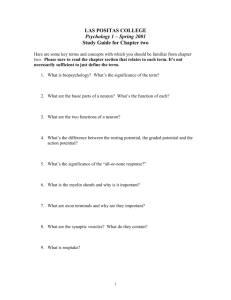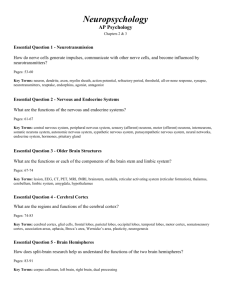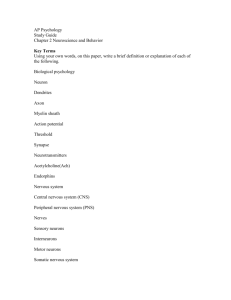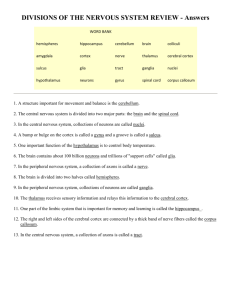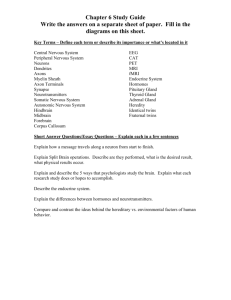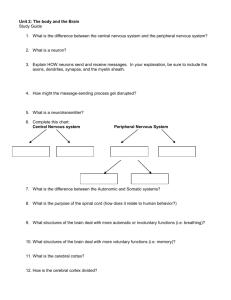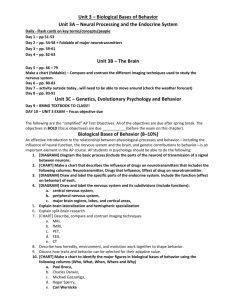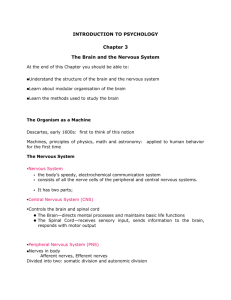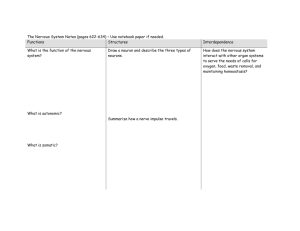AP Psychology Biology Spring 2015 Barron's Book Chapter 3 (75
advertisement
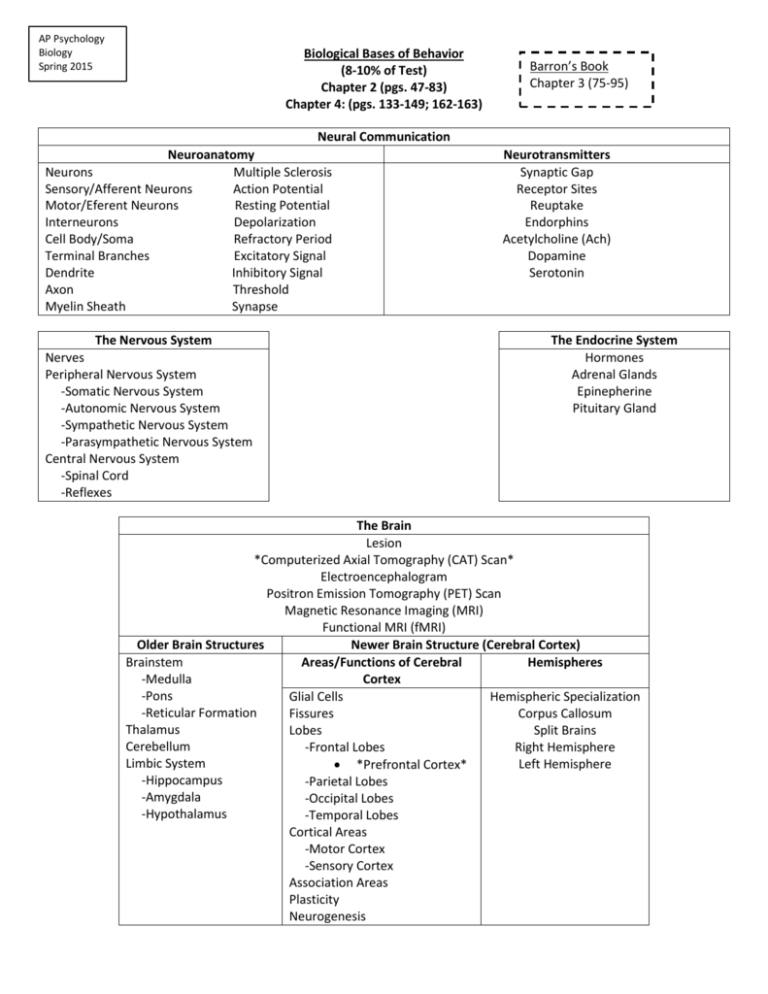
AP Psychology Biology Spring 2015 Biological Bases of Behavior (8-10% of Test) Chapter 2 (pgs. 47-83) Chapter 4: (pgs. 133-149; 162-163) Neural Communication Neuroanatomy Neurons Multiple Sclerosis Sensory/Afferent Neurons Action Potential Motor/Eferent Neurons Resting Potential Interneurons Depolarization Cell Body/Soma Refractory Period Terminal Branches Excitatory Signal Dendrite Inhibitory Signal Axon Threshold Myelin Sheath Synapse The Nervous System Nerves Peripheral Nervous System -Somatic Nervous System -Autonomic Nervous System -Sympathetic Nervous System -Parasympathetic Nervous System Central Nervous System -Spinal Cord -Reflexes Barron’s Book Chapter 3 (75-95) Neurotransmitters Synaptic Gap Receptor Sites Reuptake Endorphins Acetylcholine (Ach) Dopamine Serotonin The Endocrine System Hormones Adrenal Glands Epinepherine Pituitary Gland The Brain Lesion *Computerized Axial Tomography (CAT) Scan* Electroencephalogram Positron Emission Tomography (PET) Scan Magnetic Resonance Imaging (MRI) Functional MRI (fMRI) Older Brain Structures Newer Brain Structure (Cerebral Cortex) Brainstem Areas/Functions of Cerebral Hemispheres -Medulla Cortex -Pons Glial Cells Hemispheric Specialization -Reticular Formation Fissures Corpus Callosum Thalamus Lobes Split Brains Cerebellum -Frontal Lobes Right Hemisphere Limbic System Left Hemisphere *Prefrontal Cortex* -Hippocampus -Parietal Lobes -Amygdala -Occipital Lobes -Hypothalamus -Temporal Lobes Cortical Areas -Motor Cortex -Sensory Cortex Association Areas Plasticity Neurogenesis Neural Communication: Know the different parts of a Neuron and their function. Be able to explain what happens when a Neuron fires. Understand the role that Neurotransmitters play in neural communication. Know the function of key Neurotransmitters (Endorphins, Acetylcholine (Ach), Dopamine, Serotonin). How do drugs alter Neurotransmission (Agonists & Antagonists)? The Nervous System: What is the relationship between the Central Nervous System & the Peripheral Nervous System? Know the difference between the Somatic Nervous System and the Autonomic Nervous System. What is the difference between the Sympathetic Nervous System & the Parasympathetic Nervous System? What is the importance of the Spinal Cord to the Central Nervous System? The Endocrine System: How do the endocrine system and it’s hormones affect our behavior? What role do the adrenal glands and the pituitary gland serve? What is the relationship between the nervous & endocrine systems? The Brain: What methods do Neuroscientists use to study the brain (EEGs, PETs, MRIs, fMRIs)? Know the older brain structures & their functions. Why was the development of the Cerebral Cortex important to the evolution of mankind? What are the different lobes of the Cerebral Cortex & what are their key functions? Understand the function of the different cortical areas (Motor Cortex & Sensory Cortex). How were they discovered? What is the function of association areas? Who is Phineas Gage & what did his accident teach us about the brain? How does Brain Plasticity work? Understand specific examples of how the brain can reorganize itself after damage. What were the contributions of Roger Sperry & Michael Gazzaniga in split-brain research? What did split-brain research tell us about the brain? What are the differences in function between the right hemisphere & left hemisphere of your cerebral cortex? Genetics & Evolution: (Chapter 4: Pages 133-149) (162-163) Chromosome Temperament Genes Heritability Key Genome Molecular Genetics Vocabulary Monozygotic (Identical) twins Evolutionary Psychology Fraternal Twins Natural Selection Mutations X Chromosome Y Chromosome Testosterone Where are genes found & how are they “turned on?” What is the difference between fraternal twins & monozygotic (identical) twins? What have separated twin studies & Adopted Studies shown in regards to the nature/nurture debate? How is Heritability commonly misunderstood? How do genes & our environment interact with each other? How does Natural Selection work & what role do mutations play in the process? Know how natural selection shapes human tendencies (Taste preferences, Mating Preferences, etc) What issues have evolutionary psychologists pursued? What are the criticisms of the Evolutionary perspective? How is our gender determined & shaped by our biology?
